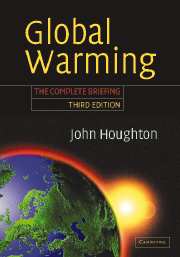Book contents
- Frontmatter
- Contents
- List of figures
- List of SI unit prefixes
- List of chemical symbols
- Preface to the First Edition
- Preface to the Second Edition
- Preface to the Third Edition
- 1 Global warming and climate change
- 2 The greenhouse effect
- 3 The greenhouse gases
- 4 Climates of the past
- 5 Modelling the climate
- 6 Climate change in the twenty-first century and beyond
- 7 The impacts of climate change
- 8 Why should we be concerned?
- 9 Weighing the uncertainty
- 10 A strategy for action to slow and stabilise climate change
- 11 Energy and transport for the future
- 12 The global village
- Glossary
- Index
Preface to the First Edition
- Frontmatter
- Contents
- List of figures
- List of SI unit prefixes
- List of chemical symbols
- Preface to the First Edition
- Preface to the Second Edition
- Preface to the Third Edition
- 1 Global warming and climate change
- 2 The greenhouse effect
- 3 The greenhouse gases
- 4 Climates of the past
- 5 Modelling the climate
- 6 Climate change in the twenty-first century and beyond
- 7 The impacts of climate change
- 8 Why should we be concerned?
- 9 Weighing the uncertainty
- 10 A strategy for action to slow and stabilise climate change
- 11 Energy and transport for the future
- 12 The global village
- Glossary
- Index
Summary
Climate change and Global warming are well up on the current political agenda. There are urgent questions everyone is asking: are human activities altering the Climate? Is Global warming a reality? How big are the changes likely to be? Will there be more serious disasters; will they be more frequent? Can we adapt to Climate change or can we change the way we do things so that we can slow down the change or even prevent it occurring?
Because the Earth's Climate system is highly complex, and because human behaviour and reaction to change is even more complex, providing answers to these questions is an enormous challenge to the world's scientists. As with many scientific problems only partial answers are available, but our knowledge is evolving rapidly, and the world's scientists have been addressing the problems with much energy and determination.
Three major pollution issues are often put together in people's minds: Global warming, ozone depletion (the Ozone hole) and acid rain. Although there are links between the science of these three issues (the chemicals which deplete ozone and the particles which are involved in the formation of acid rain also contribute to Global warming), they are essentially three distinct problems. Their most important common feature is their large scale. In the case of acid rain the emissions of sulphur dioxide from one nation's territory can seriously affect the forests and the lakes of countries which may be downwind of the pollution.
- Type
- Chapter
- Information
- Global WarmingThe Complete Briefing, pp. xxiii - xxviPublisher: Cambridge University PressPrint publication year: 2004



